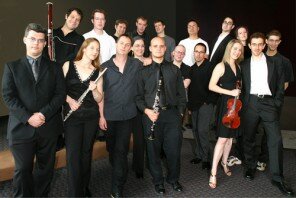Classical Music Remixed: Alarm Will Sound at Town Hall
Alarm Will Sound performs music by the Beatles, Aphex Twin, John Adams, Edgard Varèse, Stefan Freund, and Matt Marks at Town Hall Seattle on Thursday, April 26 at 7:30pm.
Strange rumblings are shaking the classical music world these days. Today’s musicians and composers are branching out from the traditional works of the classical canon, venturing further afield in search of new influences and collaborations. Increasingly, the music they write and perform crosses boundaries and blends genres, challenging our expectations of classical music.
The members of New York based ensemble Alarm Will Sound are pioneers at the cutting edge of these exciting changes. The group’s twenty musicians are all well-versed in the classical tradition, but draw influence from a broad spectrum of sounds. Their diverse repertoire includes pieces by modern classical composers like John Cage and Steve Reich, acoustic arrangements of works by electronica legend Aphex Twin, and even covers of the Beatles.
The group’s creative and experimental flair makes shifts between genres a breeze. “As a chamber orchestra, our sound has the full range of instrumental colors and, at the same time, the rhythmic flexibility of a band,” says composer and co-founder Gavin Chuck.
Chuck founded Alarm Will Sound in 2001 with a group of fellow graduates from the Eastman School of Music. “We started Alarm Will Sound because there wasn’t a large ensemble dedicated to touring contemporary classical music in the USA.”
In the past decade, that simple mission has grown into a full-scale movement devoted to “adventurous, genre-bending projects and performances”. In 2010, Alarm Will Sound collaborated with indie darlings the Dirty Projectors for three performances at major classical concert halls in London, New York, and Los Angeles.
This Thursday evening, Alarm Will Sound makes their Seattle debut at Town Hall, performing music by the Beatles, Aphex Twin, John Adams, and Edgard Varèse. Chuck notes that the program is tailor-made with variety in mind. “Whenever we play a city for the first time, we want to present the diversity of styles that exist today, so there’s a lot of contrast on the program.”
Much of that contrast lies in the increasingly blurred line between acoustic and electronic music. The oldest piece on the program is an arrangement of Edgard Varèse’s Poème électronique, an experimental electronic work composed for the 1958 Brussels World’s Fair. Chuck says the piece is a fun challenge for the ensemble. “(It’s) wild to play live because it requires stretching our acoustic instruments to produce analogs of electronic sounds.”
In 2005, Alarm Will Sound released Acoustica, an album of live-performance arrangements of pieces by electronica artist Aphex Twin. Since then, acoustic reinterpretations of Aphex Twin’s electronic stylings have been a staple at Alarm Will Sound performances.
At Thursday’s concert, the ensemble pairs Aphex Twin with another work that crosses electro-acoustic boundaries: their arrangement of the Beatles’ “Revolution 9″. ”As if that stylistic variety weren’t enough,” says Chuck, “two songs by members of the band bend genres even further: Stefan Freund’s ‘Drowning’ is a dark take on the rock ballad. And Matt Marks’ ‘A Song for Wade (This is Not That Song)’ mashes up 1950s doo-wop, Doris Day and—of all things—The Carpenters.”
Between their busy ensemble touring schedule and individual musical endeavors, Alarm Will Sound is developing a multimedia production of John Cage’s Song Books, a groundbreaking work that combines acoustic and electronic songs with theatrical performances. They’ll present Song Books in Cork, Ireland, Amsterdam, and New York City this summer.
The project has helped Alarm Will Sound grow as an ensemble. Chuck notes that Song Books‘ multimedia format “calls on each of us to push ourselves as performers beyond playing our instruments.” The production also jives well with the ensemble’s mission. ”Song Books is essentially a theatrical event that grows out of Cage’s belief that music is inherently linked to action and vice-versa. That’s an inspirational philosophy and one that’s motivated all the work we’ve done to innovate concert-hall conventions.”
Chuck predicts that such innovations will become more commonplace. “I think that all genres, including classical music, will continue to increasingly cross-pollinate.” Nowadays, Alarm Will Sound isn’t alone in their genre-bending experimentation. In the local scene, the youthful Seattle Rock Orchestra gives pop/rock favorites a symphonic spin. The ensemble has become a favorite with Seattle audiences, who regularly pack venues to hear the group’s reinterpretations of Stevie Wonder, Queen, and Radiohead.
This success shouldn’t come as a surprise to any of us. According to Chuck, the future of classical music lies in collaborative, multi-genre endeavors that feed the creative curiosity of today’s listeners. “Musicians and audiences are hungry for music that has both directness and depth, that has an immediate impact and also makes you want to explore its complexity further. Hybrid, post-genre work tends to emerge from the kind of serious play that I see our generation reveling in.”


 Daily Email Digest of The SunBreak
Daily Email Digest of The SunBreak